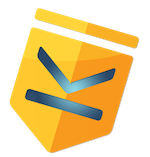
I've been hearing about information cards for the last four years or so. For that entire time, they have been largely theoretical or, at best, used for logging into a blog or something else. I'm out to change that.
A few days ago Steve Fulling was on the phone with Paul Trevethick of Parity describing a pilot project we're doing for the Locals Care organization of New Mexico. Steve said "I'll just send you the card; put it in your selector and you'll see the results in Google."
That's a pretty interesting statement: "I'll just send you a card." The reason I love it is because that's a key part of the Kynetx vision: viral web experiences. Of course, if this were a managed card, with claims, you wouldn't just send them around, but when the card has no claims, this works.
If you'd like to try it yourself, you need two things: first you need the Azigo selector. This works on Mac or Windows with IE or Firefox. One warning: it will mask your CardSpace selector but it's still there--just go to the Azigo selector switch in the Control Panel to get it back. Of course, if you haven't done anything with your CardSpace selector yet, you won't care.
Second, just import this card into the Azigo selector. Now, restart your browser and search for something local to Santa Fe, like santa fe coffee or santa fe pizza.

If everything worked, you should see a box with a yellow border and the Locals Care logo at the top of the Google search results with local results. These have been percolated up through the first ten pages of results to the top. Note that this only happens for people who have opted-in to the experience by taking the Locals Care card.
We view this result as being the triangulation of three different things:
- The page the user's looking at (e.g. Google search results)
- The dataset delineating relationships (e.g. the Locals Care database)
- The information card itself (giving the ruleset ID and, possibly, claims)
The triangulation of these three dimensions is performed by the ruleset and the Kynetx Network Service (KNS). Change the page, the dataset, or the card (and it's associated ruleset) and the results will be different. This makes it vastly more powerful and flexible than a special purpose add-on like SurfCanyon or even a Greasemonkey script. Just try getting your mom to install a Greasemonkey script. She'll have an easier time with the card, trust me.
If you're interested in the details of how all this works, I invite you to read our white paper (PDF), leave a comment, or contact me.
If you're interested in playing around a bit more, here are two more cards you can install.
- Better Craig's List - install this card and when you search on the Provo Craig's List, you'll get pictures on the results page so you don't have to click into every link.
- TwitterSpy - this card augments the Twitter search page to actually show you new results rather than just telling you when there are new ones. To see it in action, search on something that's trending up.
These two cards are missing the dataset dimension and thus "two dimensional," but it's still fun to just install a small card and get better functionality out of your browser.
Note that this process is particularly easy when you already have the selector. The selector and associate browser extension become a "universal" add-on that does it's work through the cloud. Just add a card and you've got a new, better experience. I'm biased, but I think that's pretty darn cool.




